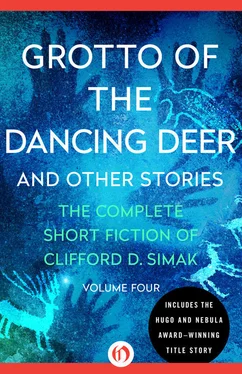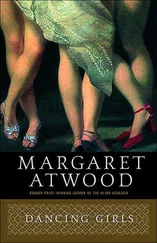The rattling wheels were closer now and the clop of the horses’ hoofs were distinct sounds in the dust. Around the bend a filmy cloud arose, the slowly drifting dust disturbed by the coach’s passing.
Packard hunkered lower in the juniper, carefully slipped the six-guns from his belt, clasped them with sure, deft hands.
The stage swung around the bend, the horses surging into the uphill pull, harness creaking with the effort. The driver slouched forward easily, reins loose in his hands, but his head darted from side to side, watching the bushes along the trail. Beside him the shotgun messenger sat bolt upright, the butt of the gun planted against his knee, muzzle pointing toward the sky, left hand grasping the barrel. Another man knelt one-kneed on top of the lurching coach, rifle at ready.
The coach lumbered past, one wheel squealing, blobs of dust dropping from the slowly moving tires and spatting in the tracks that still smoked from the passing of the iron-shod wheels.
Breath still caught in his throat, Packard watched it pass. His fingers shifted slightly, taking a new grasp on the six-gun grips.
Carefully, he raised his head a bit, stared after the coach, heard the seconds beating in his head as time slowed to an agonizing crawl.
A man rose out of the bushes, like a jack-in-the-box popping up when someone snapped the catch. A man who yelled and raised a gun and fired.
The driver rose in his seat, hauling on the reins while the horses reared, a tangled mass of leather and striking forefeet and flying manes.
The shotgun messenger half raised his gun, jerked forward as a six-gun bellowed, bending in the middle as if he were on a hinge. For a moment he hung there, etched against the morning sun, a bent over man with the gun tumbling from his hands. Then slowly he pitched forward like a diver slanting off a board, pitched forward between the horses, fell beneath their feet.
The guard on top of the coach had leaped to his feet, his rifle coming to his shoulder in one swift blur of fluid motion. A gun spatted angrily behind him, like a snarling cat, and the guard stiffened and staggered, fell and rolled, slid halfway off the coach and hung there, knee caught beneath the low iron railing that ran along the top. His hands hung down limply and swung slowly to and fro, like unsteady pendulums, while blood dripped from his mouth and spattered in the dust.
Then there was no sound except that of the driver talking to the horses, talking in a soothing tone that trilled with hidden terror, trying to quiet the animals that reared and plunged and fought the bits and kicked and shied at the bloody thing that rolled beneath their hoofs.
Packard had risen from the juniper, but had not moved, had not even raised his gun. The action had been too swift, the deadly six-gun execution too well planned.
He looked across the trail at Pinky and above his red handkerchief mask, Pinky’s eyes glittered with excitement. Smoke still trickled from the gun he held in his hairy hand.
“That’s the way we do it, kid,” said Pinky. “Fast and neat. No time or bullets wasted.”
And what he said was true, Packard realized. Only a few seconds had ticked away since Marks had risen from the bushes, only three shots had been fired and two men were dead.
Marks had stepped to the head of the horses, was fighting them to a standstill while Hurley still held his gun on the struggling driver.
Sylvester was talking to someone inside the coach, talking in a voice that was conversational, almost as if he might be chatting with a next door neighbor.
“There ain’t no cause to be alarmed, ma’am,” he was saying. “The boys don’t aim to harm a hair of your head. Just you step out and sit down in the shade while we get the dust. That’s all we want. We’ll just take the dust and be gallopin’ along.”
But he still kept a gun in his hand and he kept it in position as he moved closer, grasped the handle and jerked the coach door wide open.
“Please ma’am,” he said. “Be sensible. Yelling and screamin’ won’t help you none at all.”
“I don’t intend,” the woman told him, “to do any yelling or screaming. And I’m not coming out. I’m staying here.”
The voice sent a chill of fear through Packard—an icy chill that gripped and held him like a mighty hand. For he knew that voice, had heard it only the night before …
“She says,” Sylvester told Pinky, “that she ain’t a-comin’ out.”
“The hell she ain’t,” snarled Pinky.
Swiftly he strode forward, lunged for the door of the coach, reached in. The woman screamed and Pinky yanked, hauling her out of the door, leaping back to escape her clawing hands. She stumbled and fell in the dust.
“Get them up,” yelled Packard. “Get them up and keep them there. I’m taking over.”
Sylvester and Pinky swung around, stared at the gun-mouths that scowled at them from Packard’s fists. “You’re loco!” yelled Pinky. “You can’t—”
One of Packard’s guns drooled flame and smoke and Pinky’s hat lifted in the air, skidded downward in a rapid glide and plopped onto the ground.
“The next one,” said Packard, “will be right between the eyes.”
Wide-eyed, the two of them lifted their hands, high above their heads.
“Get out of the way, Miss Page,” said Packard quietly. “There might be some shooting if these gents should get uneasy.”
“You’re too considerate,” the girl told him. “Why don’t you shoot them down?”
“Get out of the way,” snapped Packard. “Around here people do what I say for them to do.”
He raised his voice. “Marks, you walk down this way. Hurley, climb up and throw down the gold. Both you hombres shuck your guns.”
A sledge hammer slammed into his shoulder, spun him around, and he was falling forward, the ground rushing up at him with express train speed. Through the roaring in his ears came the sullen clap of a high-powered rifle.
Pop, he thought. Pop Allen. I forgot all about the damn old fool. What did he mean by horning in, anyway? He had no business to. He was supposed to be off in the gully holding them horses.
He hit the ground and exploded, sailing off into space, part of him going one way and part of him another … but finally the pieces came back together and he was whole again and he wallowed in a bed of pain and thirst.
A voice said: “He’s coming to.” Another voice snapped: “Quit champin’ at the bit, Marks. Be a damn shame to string him up and him not know about it.”
“Ought to lug him back and hang him alongside Cardway,” someone else suggested.
The voice that had snapped, protested. “Too far. And anyhow, Randall ain’t anxious to give Hangman’s Gulch no bad name. Hangings right in town got to be legal-like … vigilantes and all the fixin’s.”
The words seeped into Packard’s brain, seeped and simmered, thoughts clawing at their meaning.
Packard’s left shoulder ached with a dull, monotonous thud that beat and beat, as if someone were hitting it with a padded hammer. His throat ached, too and when he put his right hand up to feel it, there was something there. Something that was hard and scratchy and was pressing just a bit too tight.
Feebly he clawed at the thing around his neck, trying to loosen it so he could breathe more easily. He was sitting on the ground, with his legs stretched out in front of him and his back against the hard, rough trunk of a good-sized tree. He pressed his back harder against the tree and felt the scaly bark bite into his flesh.
Sitting against a tree, with a rope around his neck. And probably the other end of that rope went over a limb somewhere above his head. One yank … one good, stout yank by a couple or three men and he would be swinging free. He would be a thing like Cardway was … swinging the way that Cardway swung in the breeze that had swooped up the canyon bed.
Читать дальше












